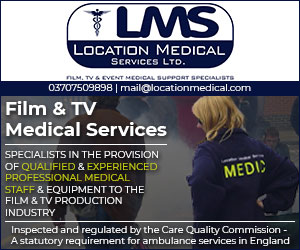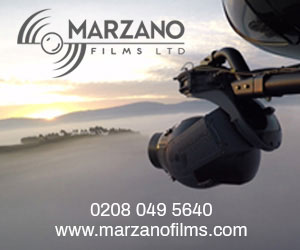Broadcast News
22/07/2016
Location, Location, Location...

In recent years, film and television production in the UK has gone from strength to strength, writes BFV Editor Jacqueline Purse.
In fact, in Q1 2016, total spend on film production in the UK was £200 million, with 27 films starting principal photography. The British Film Institute (BFI) adds that 13 high-end TV (HETV) programmes commenced principle photography between January and March 2016, with a spend in the UK of £97m. Total spend on film production (April 2015 to March 2016) in the UK was £1,337m, with HETV for the same period totalling £684m.
Just a few of the high-profile projects filmed on location throughout the UK include Sherlock: The Abominable Bride, Game of Thrones, Fast & Furious 6, and Star Wars: The Force Awakens. While a majority of us only see the final result, a lot of work has been carried out behind-the-scenes to bring the project to completion. It can be a challenging, stressful, but completely rewarding experience. Below, we look at just a few aspects involved when it comes to a location shoot.
Accessibility
There are situations where being on location can be more advantageous than filming at a studio; it may be cheaper to shoot on location, rather than construct a variety of large sets, for example. On the other hand, if a particular location lacks production companies, from supplying equipment, sets and even a local film crew, or what is available is not of the desired caliber, transporting an entire film crew and their gear to a specific location can quickly become very expensive. Cast and crew rely heavily on local facilities such as catering, transportation and accommodation while on a production, which can help bring significant economic development benefits to an area in the long term.
Therefore, conducting a recce before any filming occurs is always recommended to work out a location's suitability for shooting. In addition, a thought should be given to those supplying the gear for a film or TV production and whether location vehicles can actually reach its intended destination.
Stephen Lee, Managing Director at Jumbocruiser, recalls one particularly challenging project. "I had taken a booking for a 13m long motorhome to attend a location," he said. "When they sent me the address, I took a look on Google Maps and was able to use the video feature to see that (a) the vehicle would not get round a bend, and (b) that there would be trees that would need cutting back. I guess a lot of production crews are so excited about the project and booking the crew and equipment, they sometimes forget about access to the location."
Environment
A disadvantage of a location shoot is the obvious lack of control over the environment. This can be lighting, weather, pedestrians and even passing aircraft.
Whether rain, snow, sunshine or wind, the conditions can greatly affect filming; not only with regards to schedule and the output of the production, but to the equipment as well. Exposing video cameras to rain, sand, or moisture may cause damage to the equipment,while too much bright light and hot temperatures caused by sunlight can also damage equipment if left exposed for too long without appropriate care. Similarly, low temperatures can cause battery power to drain quicker.
Audio is just as important as visuals, and a microphone should be used to check any surrounding noise at a location. Wireless microphones, boom mics and other recording devices should also be tested for any interference, such as traffic, echoes, branches rustling or running water.
Lighting is also important; if filming is taking place indoors there are techniques to allow for a lower or higher amount of natural light to be exposed. This can be more difficult to achieve when it comes to auditoriums or churches, however, which have a lower amount of light and therefore harder to adjust to the required levels. In some instances, doors may need to be removed or lightbulbs changed.
Investment
Recently published figures from Bristol Film Office reported a 65% increase in location filming days for 2015/16 from the previous year. This included new original TV shows, returning TV series and a number of feature films. Within the period, the film office issued 370 filming permits and hosted a total of 943 location filming days. Total inward investment to the city from these productions using services provided by Bristol Film Office and The Bottle Yard Studios reached £16,674,000.
At the time, Laura Pye, Head of Culture, Bristol City Council, said: "These new figures show a consistently strong level of production and once again the services provided by Bristol Film Office and The Bottle Yard Studios have delivered an outstanding contribution to the local economy. Both the Film Office and the Bottle Yard Studios play an important role in raising the city's profile within and outside of the film industry. This is a golden age for Bristol based drama and the city's heritage as a centre of excellence for TV and film goes from strength to strength, powering employment and skills development, and attracting investment that are vital to the creative and cultural heartbeat of the city."
Tourism can be another long-lasting benefit from location filming as a TV show or film can introduce a global audience to a stunning location that they were previously unaware of. A perfect example of this is in Northern Ireland thanks to HBO smash hit series Game Of Thrones.
Community
On a similar vein, with local investment, comes the local community. A location shoot can cause disruption to the daily routine of a selected town or city; from roads or bridges being closed for a number of hours, to usually public areas (such as a town hall or town square) often being inaccessible. Advanced information does tend to be shared with those who will be affected, but there are times when incidents can still occur.
In February of this year, a London bus exploded while crossing Lambeth Bridge. The incident caused panic and confusion until it was revealed that the explosion was actually part of a film stunt for an upcoming Hollywood movie. Many of those involved in the stunt were quick to clarify the reason for the explosion, but the production company, as well as the police and Transport for London were criticised for the confusion caused. All of the correct permissions and permits had been received to carry out the scene, and information had been circulated among local businesses and residents, telling them to expect a 'controlled explosion' that morning. Others said that the communication from the various organisations was not clear enough.
Permissions
Filming on location is not as simple as just picking a post and setting up production. There are numerous legal issues that need to be resolved beforehand with various permits needed depending on the type of shoot. While there are a few exceptions to the rule, Film London said that to film on location, it is likely you'll need to notify or get permission from somebody.
There are different rules surrounding shooting buildings, public places, objects, people, children and animals. But whatever or whoever you are filming, it needs to be legal. The relevant screen agencies and film offices can assist with this information. One authority that will need to be notified, particularly if there are plans to film on a public highway, is the local police force. This also includes if special effects, explosives or fire arms – including replicas – are to be used during production.
Finance
Just as permission is usually always required, so is a film location fee, whether it is a council-owned property, privately-owned property or open space. The local Film Office will be able to assist with relevant contacts and advice in each instance. Fees will vary depending on the production, but they are viewed as important for the sector, particularly with regards to reinvestment.
London-based Reel Film Locations provides local Borough and privately-owned locations and advice to the film industry. Dennis Firminger from the company explained: "We have seen seven years of austerity take away maintenance budgets for important historic listed buildings so the contribution of location fees is an immense benefit to local authority budgets. A lack of development has meant that properties are often in a static 'standstill' situation, maybe only open to the public at weekends when voluntary staff are available to manage the property.
"This gives great scope to film companies wanting to shoot on weekdays who do not have to contend with public opening. One property in this situation is Boston Manor in Brentford (LB Hounslow) which has been unused, except for weekend opening, since 2005, but boasts both historic rooms and a disused wing which allows film companies to dress and redecorate according to need."
The property has been used on productions such as Egypt (BBC TV, 2005), Lewis (ITV, 2014) and Jack Ryan – Shadow Recruit (2014).
Firminger adds that throughout London, local hospital trusts are finding their equally squeezed budgets can be augmented by allowing film companies to work in empty wards or at weekends in outpatient areas. Goodmayes Hospital in East London, is one such example. It has allowed filming to take place over a number of years thanks to close cooperation and liaison between the Hospital Trust and Reel Film Locations. Difficult problems on the ground have been overcome by anticipating the needs of film companies and providing controlled access to the areas of the hospital where filming is possible. Some buildings within the complex have naturally fallen into disuse and these areas provide fertile pickings for location managers looking for period locations.
Insurance
All productions, whether domestic or international, also need proof of Public Liability Insurance in order to receive permission to film. This insurance covers the legal responsibilities of a production if the project causes injury to a third party or damage to property. Health and safety is essential to a shoot, and if these regulations are not adhered to, it can render an insurance policy invalid.
A minimum cover for insurance is often required, ranging from between £2 million and £5 million. The amount of cover required varies depending on the size of a production, the location being used and what the shoot will entail. Production teams should also be aware that to be insured by a UK insurance company, they need to be based in the UK. Non-UK filmmakers may be able to obtain insurance through a broker in the country in which they are based, but the relevant documents will need to be translated into English. It should also be noted that not all locations will accept non-UK policies.
International
For international filmmakers, it can be tricky to decipher what is and is not allowed when it comes to filming in the UK. In the first instance, production companies are advised to contact an organisation such as Film London with as much detail about the project as possible and what they want to do. Information required includes the production company, production title, the type of production, any production contacts (as well as names, mobile numbers, email addresses, etc.), shoot dates in the UK, locations required, if a location manager is needed, description of the action or scenes to be filmed.
The services of Film London are free and staff can assist with locations advice, pre-production meetings, crew and facilities hire and accommodation/travel discounts. Other organisations with practical advice for a location shoot include the British High Commission website which provides information about visas (including film groups). The British Film Commission (BFC) also provides information to international crews, while specific information about tax relief and co-productions can be found on the British Film Institute (BFI) website.
Training
While nothing compares to actually being on location for that 'hands on' experience, there are a number of accredited courses that new – or experienced – professionals can complete. One example is the National Film and Television School's (NFTS) two-year Cinematography course at MA level.
The curriculum involves exercises, workshops, masterclasses and productions with specialist tutors and visiting professionals. The seminars cover stylistic approaches, principles of optics and photographic and video theory, and the importance of relationships and interaction with other specialisations, like directors, editors, designers, sound and post production. Workshops and Practical Exercises are designed to teach most aspects of traditional and digital cinematography including cameras, lenses, grip equipment, originating materials (film stock/tape), light meters, location lighting, studio lighting, day for night, night for night, filming in moving vehicles and also film grammar, crew roles, studio protocol, laboratory procedures and special visual effects.
Whilst the above touches on aspects of location filming, the NFTS also runs a specific short course – Location Sound Recording. It is aimed at industry professionals wanting a better understanding of sound recording, and provides the background knowledge, theory and practical skills required to achieve broadcast quality sound. The course involves recording sound on location, working methods for single camera drama and documentary shooting, microphones (use, tips and techniques), location mixers, digital video cameras and recorders, an overview of non-linear and multi-track recording, timecode, stereo, and first line maintenance. By the end of the course, participants will be armed with the knowledge of what is technically – and aesthetically – required to record sound for television and film production.
This article is also available to read at BFV online here, page 24.
(JP/LM)
In fact, in Q1 2016, total spend on film production in the UK was £200 million, with 27 films starting principal photography. The British Film Institute (BFI) adds that 13 high-end TV (HETV) programmes commenced principle photography between January and March 2016, with a spend in the UK of £97m. Total spend on film production (April 2015 to March 2016) in the UK was £1,337m, with HETV for the same period totalling £684m.
Just a few of the high-profile projects filmed on location throughout the UK include Sherlock: The Abominable Bride, Game of Thrones, Fast & Furious 6, and Star Wars: The Force Awakens. While a majority of us only see the final result, a lot of work has been carried out behind-the-scenes to bring the project to completion. It can be a challenging, stressful, but completely rewarding experience. Below, we look at just a few aspects involved when it comes to a location shoot.
Accessibility
There are situations where being on location can be more advantageous than filming at a studio; it may be cheaper to shoot on location, rather than construct a variety of large sets, for example. On the other hand, if a particular location lacks production companies, from supplying equipment, sets and even a local film crew, or what is available is not of the desired caliber, transporting an entire film crew and their gear to a specific location can quickly become very expensive. Cast and crew rely heavily on local facilities such as catering, transportation and accommodation while on a production, which can help bring significant economic development benefits to an area in the long term.
Therefore, conducting a recce before any filming occurs is always recommended to work out a location's suitability for shooting. In addition, a thought should be given to those supplying the gear for a film or TV production and whether location vehicles can actually reach its intended destination.
Stephen Lee, Managing Director at Jumbocruiser, recalls one particularly challenging project. "I had taken a booking for a 13m long motorhome to attend a location," he said. "When they sent me the address, I took a look on Google Maps and was able to use the video feature to see that (a) the vehicle would not get round a bend, and (b) that there would be trees that would need cutting back. I guess a lot of production crews are so excited about the project and booking the crew and equipment, they sometimes forget about access to the location."
Environment
A disadvantage of a location shoot is the obvious lack of control over the environment. This can be lighting, weather, pedestrians and even passing aircraft.
Whether rain, snow, sunshine or wind, the conditions can greatly affect filming; not only with regards to schedule and the output of the production, but to the equipment as well. Exposing video cameras to rain, sand, or moisture may cause damage to the equipment,while too much bright light and hot temperatures caused by sunlight can also damage equipment if left exposed for too long without appropriate care. Similarly, low temperatures can cause battery power to drain quicker.
Audio is just as important as visuals, and a microphone should be used to check any surrounding noise at a location. Wireless microphones, boom mics and other recording devices should also be tested for any interference, such as traffic, echoes, branches rustling or running water.
Lighting is also important; if filming is taking place indoors there are techniques to allow for a lower or higher amount of natural light to be exposed. This can be more difficult to achieve when it comes to auditoriums or churches, however, which have a lower amount of light and therefore harder to adjust to the required levels. In some instances, doors may need to be removed or lightbulbs changed.
Investment
Recently published figures from Bristol Film Office reported a 65% increase in location filming days for 2015/16 from the previous year. This included new original TV shows, returning TV series and a number of feature films. Within the period, the film office issued 370 filming permits and hosted a total of 943 location filming days. Total inward investment to the city from these productions using services provided by Bristol Film Office and The Bottle Yard Studios reached £16,674,000.
At the time, Laura Pye, Head of Culture, Bristol City Council, said: "These new figures show a consistently strong level of production and once again the services provided by Bristol Film Office and The Bottle Yard Studios have delivered an outstanding contribution to the local economy. Both the Film Office and the Bottle Yard Studios play an important role in raising the city's profile within and outside of the film industry. This is a golden age for Bristol based drama and the city's heritage as a centre of excellence for TV and film goes from strength to strength, powering employment and skills development, and attracting investment that are vital to the creative and cultural heartbeat of the city."
Tourism can be another long-lasting benefit from location filming as a TV show or film can introduce a global audience to a stunning location that they were previously unaware of. A perfect example of this is in Northern Ireland thanks to HBO smash hit series Game Of Thrones.
Community
On a similar vein, with local investment, comes the local community. A location shoot can cause disruption to the daily routine of a selected town or city; from roads or bridges being closed for a number of hours, to usually public areas (such as a town hall or town square) often being inaccessible. Advanced information does tend to be shared with those who will be affected, but there are times when incidents can still occur.
In February of this year, a London bus exploded while crossing Lambeth Bridge. The incident caused panic and confusion until it was revealed that the explosion was actually part of a film stunt for an upcoming Hollywood movie. Many of those involved in the stunt were quick to clarify the reason for the explosion, but the production company, as well as the police and Transport for London were criticised for the confusion caused. All of the correct permissions and permits had been received to carry out the scene, and information had been circulated among local businesses and residents, telling them to expect a 'controlled explosion' that morning. Others said that the communication from the various organisations was not clear enough.
Permissions
Filming on location is not as simple as just picking a post and setting up production. There are numerous legal issues that need to be resolved beforehand with various permits needed depending on the type of shoot. While there are a few exceptions to the rule, Film London said that to film on location, it is likely you'll need to notify or get permission from somebody.
There are different rules surrounding shooting buildings, public places, objects, people, children and animals. But whatever or whoever you are filming, it needs to be legal. The relevant screen agencies and film offices can assist with this information. One authority that will need to be notified, particularly if there are plans to film on a public highway, is the local police force. This also includes if special effects, explosives or fire arms – including replicas – are to be used during production.
Finance
Just as permission is usually always required, so is a film location fee, whether it is a council-owned property, privately-owned property or open space. The local Film Office will be able to assist with relevant contacts and advice in each instance. Fees will vary depending on the production, but they are viewed as important for the sector, particularly with regards to reinvestment.
London-based Reel Film Locations provides local Borough and privately-owned locations and advice to the film industry. Dennis Firminger from the company explained: "We have seen seven years of austerity take away maintenance budgets for important historic listed buildings so the contribution of location fees is an immense benefit to local authority budgets. A lack of development has meant that properties are often in a static 'standstill' situation, maybe only open to the public at weekends when voluntary staff are available to manage the property.
"This gives great scope to film companies wanting to shoot on weekdays who do not have to contend with public opening. One property in this situation is Boston Manor in Brentford (LB Hounslow) which has been unused, except for weekend opening, since 2005, but boasts both historic rooms and a disused wing which allows film companies to dress and redecorate according to need."
The property has been used on productions such as Egypt (BBC TV, 2005), Lewis (ITV, 2014) and Jack Ryan – Shadow Recruit (2014).
Firminger adds that throughout London, local hospital trusts are finding their equally squeezed budgets can be augmented by allowing film companies to work in empty wards or at weekends in outpatient areas. Goodmayes Hospital in East London, is one such example. It has allowed filming to take place over a number of years thanks to close cooperation and liaison between the Hospital Trust and Reel Film Locations. Difficult problems on the ground have been overcome by anticipating the needs of film companies and providing controlled access to the areas of the hospital where filming is possible. Some buildings within the complex have naturally fallen into disuse and these areas provide fertile pickings for location managers looking for period locations.
Insurance
All productions, whether domestic or international, also need proof of Public Liability Insurance in order to receive permission to film. This insurance covers the legal responsibilities of a production if the project causes injury to a third party or damage to property. Health and safety is essential to a shoot, and if these regulations are not adhered to, it can render an insurance policy invalid.
A minimum cover for insurance is often required, ranging from between £2 million and £5 million. The amount of cover required varies depending on the size of a production, the location being used and what the shoot will entail. Production teams should also be aware that to be insured by a UK insurance company, they need to be based in the UK. Non-UK filmmakers may be able to obtain insurance through a broker in the country in which they are based, but the relevant documents will need to be translated into English. It should also be noted that not all locations will accept non-UK policies.
International
For international filmmakers, it can be tricky to decipher what is and is not allowed when it comes to filming in the UK. In the first instance, production companies are advised to contact an organisation such as Film London with as much detail about the project as possible and what they want to do. Information required includes the production company, production title, the type of production, any production contacts (as well as names, mobile numbers, email addresses, etc.), shoot dates in the UK, locations required, if a location manager is needed, description of the action or scenes to be filmed.
The services of Film London are free and staff can assist with locations advice, pre-production meetings, crew and facilities hire and accommodation/travel discounts. Other organisations with practical advice for a location shoot include the British High Commission website which provides information about visas (including film groups). The British Film Commission (BFC) also provides information to international crews, while specific information about tax relief and co-productions can be found on the British Film Institute (BFI) website.
Training
While nothing compares to actually being on location for that 'hands on' experience, there are a number of accredited courses that new – or experienced – professionals can complete. One example is the National Film and Television School's (NFTS) two-year Cinematography course at MA level.
The curriculum involves exercises, workshops, masterclasses and productions with specialist tutors and visiting professionals. The seminars cover stylistic approaches, principles of optics and photographic and video theory, and the importance of relationships and interaction with other specialisations, like directors, editors, designers, sound and post production. Workshops and Practical Exercises are designed to teach most aspects of traditional and digital cinematography including cameras, lenses, grip equipment, originating materials (film stock/tape), light meters, location lighting, studio lighting, day for night, night for night, filming in moving vehicles and also film grammar, crew roles, studio protocol, laboratory procedures and special visual effects.
Whilst the above touches on aspects of location filming, the NFTS also runs a specific short course – Location Sound Recording. It is aimed at industry professionals wanting a better understanding of sound recording, and provides the background knowledge, theory and practical skills required to achieve broadcast quality sound. The course involves recording sound on location, working methods for single camera drama and documentary shooting, microphones (use, tips and techniques), location mixers, digital video cameras and recorders, an overview of non-linear and multi-track recording, timecode, stereo, and first line maintenance. By the end of the course, participants will be armed with the knowledge of what is technically – and aesthetically – required to record sound for television and film production.
This article is also available to read at BFV online here, page 24.
(JP/LM)
More Locations, Location Facilities, Services Stories
11/10/2017
Squarewheels Adds To Fleet
Squarewheels is proud to announce it has recently added to its fleet, with the introduction of two new Location Buses. The vehicles come with air cond
Squarewheels Adds To Fleet
Squarewheels is proud to announce it has recently added to its fleet, with the introduction of two new Location Buses. The vehicles come with air cond
18/05/2017
AMRO Facilities – Servicing The TV & Film Industry
AMRO Facilities Ltd started in 2008 by supplying camera cars within the TV and Film industry and soon became recognised as a leading supplier of quali
AMRO Facilities – Servicing The TV & Film Industry
AMRO Facilities Ltd started in 2008 by supplying camera cars within the TV and Film industry and soon became recognised as a leading supplier of quali
22/07/2016
Location, Location, Location...
In recent years, film and television production in the UK has gone from strength to strength, writes BFV Editor Jacqueline Purse. In fact, in Q1 2016,
Location, Location, Location...
In recent years, film and television production in the UK has gone from strength to strength, writes BFV Editor Jacqueline Purse. In fact, in Q1 2016,
20/06/2016
jj Locations Announces Acquisitions
jj Locations has announced the acquisition of SNAP Studios and ThreeFour Lighting & Camera Hire. SNAP spans a 15,000 sq ft area, encompassing five bes
jj Locations Announces Acquisitions
jj Locations has announced the acquisition of SNAP Studios and ThreeFour Lighting & Camera Hire. SNAP spans a 15,000 sq ft area, encompassing five bes















